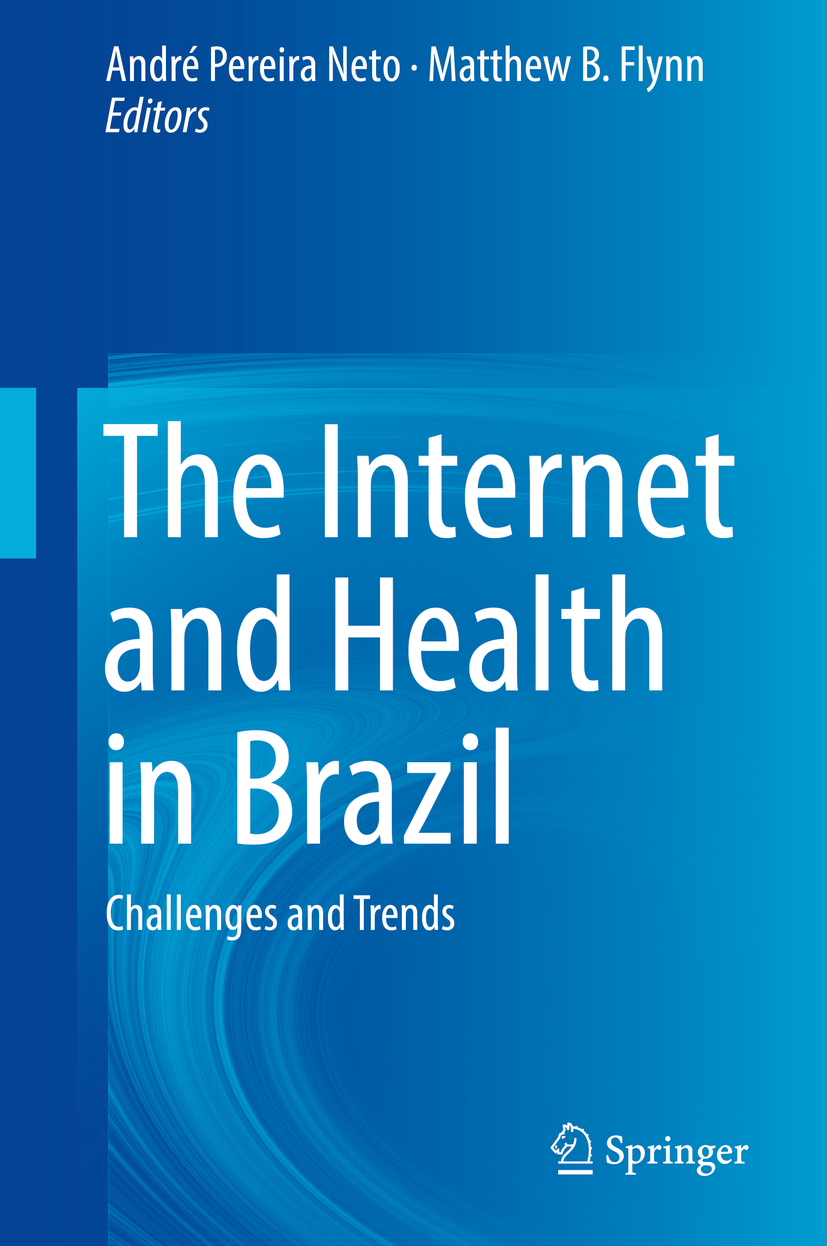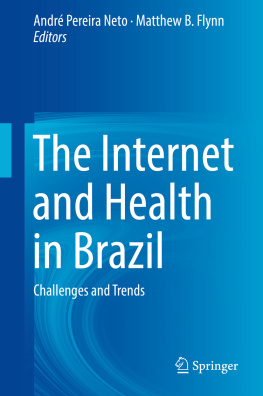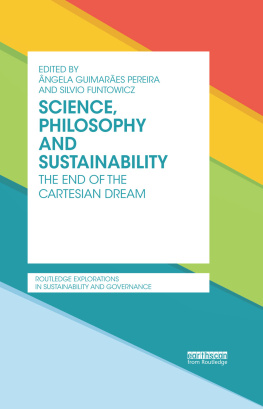André Pereira Neto - The Internet and Health in Brazil
Here you can read online André Pereira Neto - The Internet and Health in Brazil full text of the book (entire story) in english for free. Download pdf and epub, get meaning, cover and reviews about this ebook. publisher: Springer International Publishing, genre: Politics. Description of the work, (preface) as well as reviews are available. Best literature library LitArk.com created for fans of good reading and offers a wide selection of genres:
Romance novel
Science fiction
Adventure
Detective
Science
History
Home and family
Prose
Art
Politics
Computer
Non-fiction
Religion
Business
Children
Humor
Choose a favorite category and find really read worthwhile books. Enjoy immersion in the world of imagination, feel the emotions of the characters or learn something new for yourself, make an fascinating discovery.
- Book:The Internet and Health in Brazil
- Author:
- Publisher:Springer International Publishing
- Genre:
- Rating:3 / 5
- Favourites:Add to favourites
- Your mark:
- 60
- 1
- 2
- 3
- 4
- 5
The Internet and Health in Brazil: summary, description and annotation
We offer to read an annotation, description, summary or preface (depends on what the author of the book "The Internet and Health in Brazil" wrote himself). If you haven't found the necessary information about the book — write in the comments, we will try to find it.
The Internet and Health in Brazil — read online for free the complete book (whole text) full work
Below is the text of the book, divided by pages. System saving the place of the last page read, allows you to conveniently read the book "The Internet and Health in Brazil" online for free, without having to search again every time where you left off. Put a bookmark, and you can go to the page where you finished reading at any time.
Font size:
Interval:
Bookmark:


This Springer imprint is published by the registered company Springer Nature Switzerland AG
The registered company address is: Gewerbestrasse 11, 6330 Cham, Switzerland
This book is dedicated to Bia, Rafael, Pedro, and Gabriela, who closely followed the pain and delight of this dream that becomes reality.
The book is also dedicated to Lucas who is a true digital native.
The use of the Internet for health-related purposes has reached overall massive proportions, although local national realities still largely differ one from the other around the world. The Internet, with its open design allowing communication among current and future technology, and the World Wide Web open architecture, enabling easy access and popular participation, need no presentation: their importance can hardly be overstated. But, as this chapter illustrates, e-health or health-related Internet-based technology and the implications associated to its diffusion go well beyond the technological scale, to include multidimensional means of connecting, accessing, and delivering health care and well-being from multiple agents. Nowadays, more and more people and things are connected to one another than at any other point in human history. The implications of the broad adoption of the Internet and the web are so important that we are living in a new phase of the digital era: an Internet-based digital or interdigital era (Murero 2012, 2018a). Information and communication technologies (ICTs), and in particular the Internet, have been supporting the development of unprecedented practices for accessing, receiving, providing, and seeking health care.
Most popular accounts focus on an overgeneralization of the concept of health as simple absence of disease. In truth, health is a multidimensional concept. It is not only a physical condition related to the absence of disease but also a status of mental and social well-being.
Given its multidimensionality, health is not only a physical status, or the simple absence of sickness; it includes mental and social well-being. In other words, health equates to well-being.
The World Health Organization (WHO), a United Nations specialized agency that is concerned with international public health and represents hundreds of Member States, including Brazil, offers a multidimensional definition of health in its constitution. Since 1948, the definition of health guides WHOs policies and programs, affecting Member States and their Ministry of Health systems:
[] Health is a state of complete physical, mental and social well-being and not merely the absence of disease or infirmity. (WHO 2018)
What role are new technologies playing in the development of current scenarios, and in this context, what is health care? When considering health from a well-being perspective, as I am proposing in this chapter, health care results from multiple determinants affecting both patients and health-care providers. In this context, health care is mainly concerned with the maintenance or restoration of a multidimensional state of physical, mental, and social well-being by trained and licensed providers. Therefore, health care becomes the result of multiple variables that include, but are not limited to, the use of high-tech diagnostic instruments, professional skills, effective medical treatments, but also prevention. Moreover, health care determining factors may also include education, the quality of the environment, personal lifestyle, genetics, nutrition, family culture and values, available resources, online information, and more. The socioeconomic determinants of health are the conditions in which people live, grow, work, and receive health care. Socioeconomic conditions are mainly responsible for health status, equities, and inequities between countries. These conditions are largely affected by the economy of distribution of the resources available at the local, regional, national, and international levels. In this context, the availability of information and communication technologies (ICTs) to access information and care, maintain, and restore health is becoming an essential dimension affecting the quality of individual and social well-being.
The majority of the worlds health-care systems are mainly concerned with treating and preventing diseases rather than promoting well-being. When observing how users of ICTs meet their health-care needs online, a definition closer to the concept of well-being, rather than the notion of absence of sickness, emerges (Murero and Rice 2006).
E-health is a broad term encompassing a wide variety of technologies and socio-communicative practices used by health-care providers, patients, and health seekers. The academic literature shows that there is no general consensus on a standardized terminology for defining the field of the Internet and health: this is due, in part, to the dynamic of a rapidly evolving field both in terms of new tools, applications, and online practices (Eysenbach 2001; Oh et al. 2005; Murero and Rice 2006). Current popular terms include e-health or eHealth, Medical Informatics, Consumer Health Informatics, Medicine 2.0, Digital Health, mHealth, Health 2.0, and more. While each of these terms defines specific aspects of Internet-mediated access to health practices, they may overlap only in part. Some scholars focus on the technological dimensions of the phenomenon, some on the sociological aspects, and others offer an interdisciplinary approach, like the one I am developing in this chapter. Internet-based technologies consist of a wide variety of telecommunication infrastructures, architectures, protocols, platform services, and smartphone-based apps. The popularization of the Internet and the invention of the World Wide Web date only to the early 1990s.
Font size:
Interval:
Bookmark:
Similar books «The Internet and Health in Brazil»
Look at similar books to The Internet and Health in Brazil. We have selected literature similar in name and meaning in the hope of providing readers with more options to find new, interesting, not yet read works.
Discussion, reviews of the book The Internet and Health in Brazil and just readers' own opinions. Leave your comments, write what you think about the work, its meaning or the main characters. Specify what exactly you liked and what you didn't like, and why you think so.











